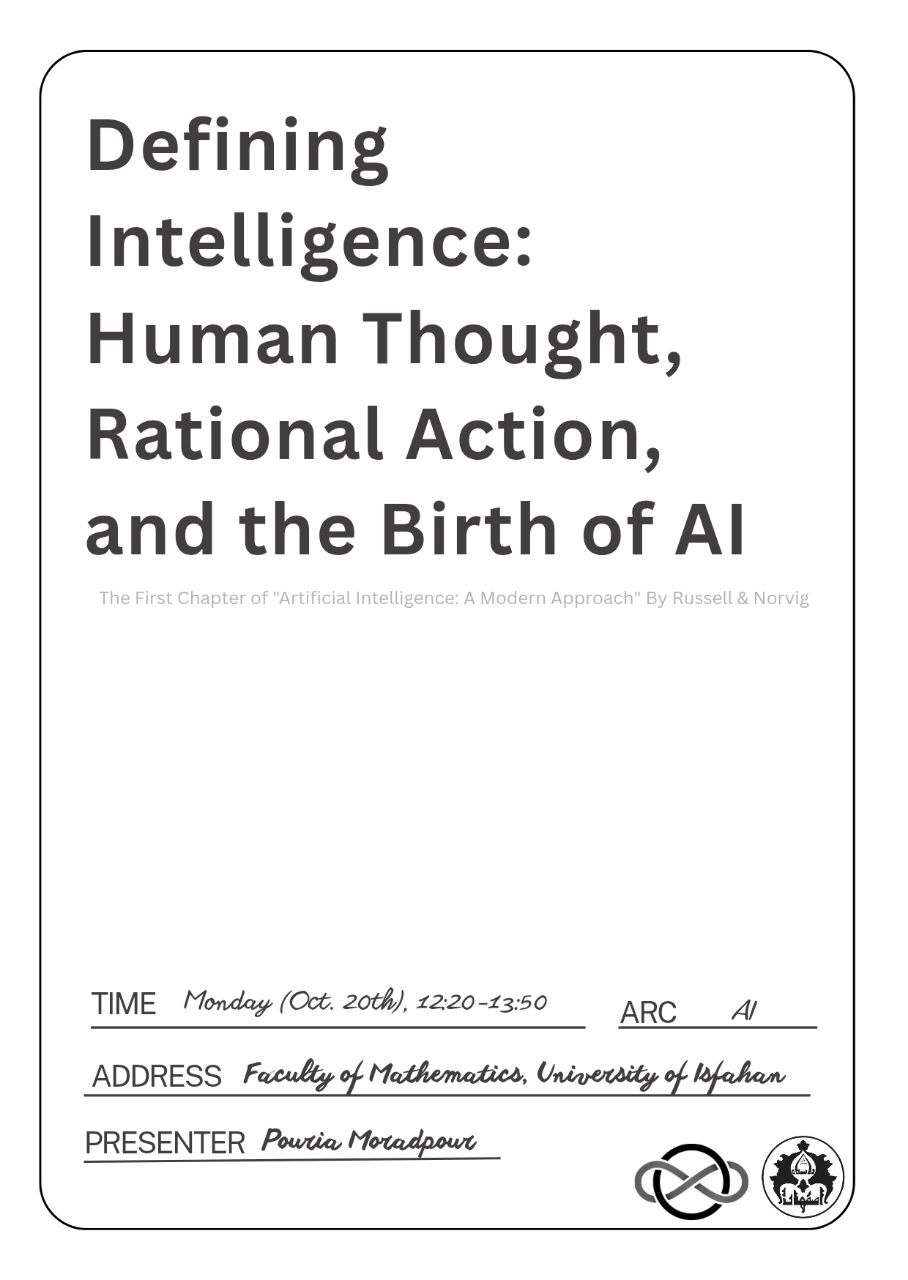
🧠 Session Review
Session Title: Defining Intelligence Date: 2025-10-20 Presenter: Pouria Moradpour Slides: Defining Intelligence.pdf Reviewed by: Pouria Moradpour
👥 Attendees
- Ali Fazel
- Behnam Moein
- Ehsan Ghaderi
- Farnoush Pourshaban
- Hossein Karimjafari
- Mohammad-Ali Safaei
- Mohammad-Amin Mojahedi
- Mohammad-Erfan Moradi
- Mohammad Mozaffari
- Pouyan Motamedi
- Pouria Moradpour
- Pouria Yousefi
- Reyhaneh Baqeri
- Reza Mirmohammadsadeqi
- Shayan Najafian
- Tahmineh Torabi
- Yahya Izadi
- Zahra Tabatabaei
🗣️Discussion Questions
What do you think about these quotes?
-
“We add and subtract in our silent thoughts.” — Thomas Hobbes
-
One problem with a purely physical conception of the mind is that it seems to leave little room for free will: if the mind is governed entirely by physical laws, then it has no more free will than a rock “deciding” to fall toward the center of the earth.
-
“Nothing is in the understanding, which was not first in the senses.” — John Locke
-
“Actions are justified by a logical connection between goals and knowledge of the action’s outcome.” — Aristotle
-
How do the four core definitions of AI (thinking/acting, humanly/rationally) set fundamentally competing objectives for research, and in what ways does the concept of providing a mathematically well-defined standard for success transcend mimicking human behavior?
-
The chapter establishes that perfection is often computationally infeasible, leading to the concept of limited rationality. In what ways does the mathematical concept — the distinction between polynomial and exponential growth in complexity — force AI systems to adopt principles of limited or bounded rationality in real-world environments?
-
How did the fundamental mathematical limits demonstrated by Gödel’s work, which showed the existence of statements in powerful formal theories, combine with practical constraints to force early AI researchers to abandon the dream of building complete, purely logical reasoning agents?
📝 Summary
The session was kicked off by a presentation mostly highlighting and going through the first chapter of Artificial Intelligence: A Modern Approach. The 4 approaches to artificial intelligence were defined and compared. Key contributions of other fields were highlighted. A timeline of AI History was also demonstrated. After a 10-minute break, the discussion was started with a debate around some - mostly philosophical - quotes. The main theme was about “free will” which lead us to a bit of neuroscience and congnitive science too. the discussion was continued with a quick explanation of computational complexity theory and how does it affect AI systems. We wrapped up the session with a quick dive into how intractability of propositional logic and undecidability of first order logic affect AI.
💬 Discussion Highlights
- Persian Poets avoided reading their own poems to avoid becoming “closed-minded” and to be able to produce creative poems. At the other end of the spectrum, if someone is isolated from other people & nature, they’re probably not very creative. This concept of creativity and lack of it can be roughly seen in AI as well. We need an AI model to be trained on data but unsuitable - or too few for the model’s parameters - data could result into overfitting.
- “The quest for “artificial flight” succeeded when the Wright brothers and others stopped imitating birds and started using wind tunnels and learning about aerodynamics. Aeronautical engineering texts do not define the goal of their field as making “machines that fly so exactly like pigeons that they can fool even other pigeons.” We are, still, unable to create a pigeon! while we have created efficient airplanes. Similarly, we even do not know how exactly does brain work. In fact, we appear to be far from it. While there has been advancements towards a computer “mimicking” humans.
🧾 References & Resources
- the first chapter of “Artificial Intelligence: A Modern Approach” by Russell & Norvig